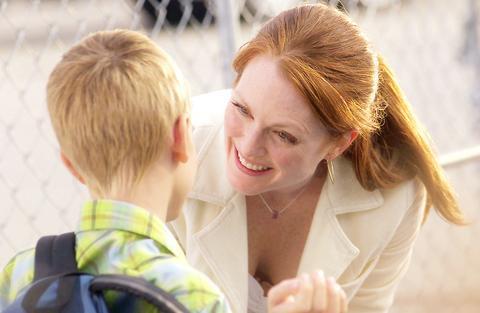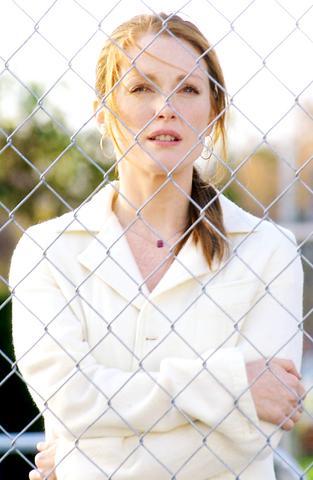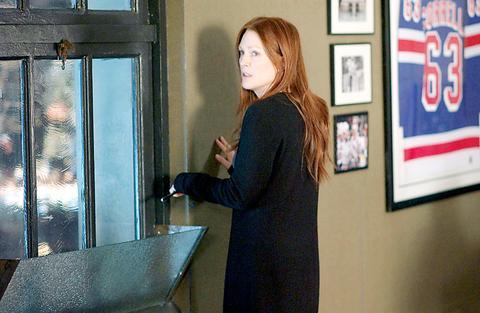The actress Julianne Moore has one face as transparent as water, the other as opaque as a mystery. With her milky complexion and lapidary features, Moore can seem alarmingly fragile, as breakable and translucent as fine French porcelain. It's a face that suggests vulnerability, femininity and an almost otherworldly ethereality.
But there is a tough side to the actress, too, a core resolve that can harden her beauty into a mask, and it is in the space between her perceived delicacy and this mask that Moore does her best work. For filmmakers who know how to put her faces into play, the actress can work wonders, as she did for the director Todd Haynes in Safe and his wrenching melodrama Far From Heaven.

PHOTOS COURTESY OF BVI
In the preposterous thriller The Forgotten, however, a pseudospiritual, mumbo-jumbo, science-fiction inflected mess that opens in Taiwan today, the director Joseph Ruben does not just fail to tap into Moore's talent; he barely gets her attention. As Telly, a Brooklyn mother in mourning, Moore delivers a performance that has all the emotional commitment of a bored kid playing with a light switch. Even after Telly discovers that all the images of her dead son, Sam (Christopher Kovaleski), have been erased from the photographs scattered around her home, Moore keeps flipping the switch: sad, not sad, sad, not sad.

PHOTOS COURTESY OF BVI
Initially, the disappearing images are explained away by Telly's creepy psychiatrist, Dr. Munce (Gary Sinise). As her husband (Anthony Edwards) nervously sits by, Telly learns that Sam never existed and that, after suffering a miscarriage, she invented the boy out of thin air. Telly finds this hard to believe (she isn't the only one) and embarks on a Search for the Truth.
The search leads her to a hard-drinking ex-hockey player, Ash (Dominic West), whose watery eyes obscure a sensitive soul and potential romantic interest. Burdened with his own tragedy, Ash joins Telly in her increasingly mysterioso quest, one that takes them from under the Brooklyn Bridge to the wilds of Long Island and, in due course, involves the National Security Agency, a police detective (Alfre Woodard), an omniscient stranger (Linus Roache) and some tawdry special effects.

In the 1987 pulp-horror movie The Stepfather, Ruben managed to squeeze first-rate chills and atmosphere from what might have been just another sleazy serial-killer flick. In the years since, he has ranged across genres, doing his best work with cryptohorror thrillers like Sleeping With the Enemy. Here, however, working with a screenplay credited to Gerald Di Pego, Ruben never settles into a coherent groove, partly because the movie simultaneously tries for cheap thrills, emotional uplift and some nonsense about the eternal mother. The other problem is that the film takes too long to let us know what is going on and why. Like a good striptease, a good thriller reveals its secrets a little at a time because without the buildup, the shivers of anticipation, we may not want to stick around.

May 18 to May 24 Pastor Yang Hsu’s (楊煦) congregation was shocked upon seeing the land he chose to build his orphanage. It was surrounded by mountains on three sides, and the only way to access it was to cross a river by foot. The soil was poor due to runoff, and large rocks strewn across the plot prevented much from growing. In addition, there was no running water or electricity. But it was all Yang could afford. He and his Indigenous Atayal wife Lin Feng-ying (林鳳英) had already been caring for 24 orphans in their home, and they were in

On May 2, Chinese Nationalist Party (KMT) Chairman Eric Chu (朱立倫), at a meeting in support of Taipei city councilors at party headquarters, compared President William Lai (賴清德) to Hitler. Chu claimed that unlike any other democracy worldwide in history, no other leader was rooting out opposing parties like Lai and the Democratic Progressive Party (DPP). That his statements are wildly inaccurate was not the point. It was a rallying cry, not a history lesson. This was intentional to provoke the international diplomatic community into a response, which was promptly provided. Both the German and Israeli offices issued statements on Facebook

President William Lai (賴清德) yesterday delivered an address marking the first anniversary of his presidency. In the speech, Lai affirmed Taiwan’s global role in technology, trade and security. He announced economic and national security initiatives, and emphasized democratic values and cross-party cooperation. The following is the full text of his speech: Yesterday, outside of Beida Elementary School in New Taipei City’s Sanxia District (三峽), there was a major traffic accident that, sadly, claimed several lives and resulted in multiple injuries. The Executive Yuan immediately formed a task force, and last night I personally visited the victims in hospital. Central government agencies and the

Australia’s ABC last week published a piece on the recall campaign. The article emphasized the divisions in Taiwanese society and blamed the recall for worsening them. It quotes a supporter of the Taiwan People’s Party (TPP) as saying “I’m 43 years old, born and raised here, and I’ve never seen the country this divided in my entire life.” Apparently, as an adult, she slept through the post-election violence in 2000 and 2004 by the Chinese Nationalist Party (KMT), the veiled coup threats by the military when Chen Shui-bian (陳水扁) became president, the 2006 Red Shirt protests against him ginned up by